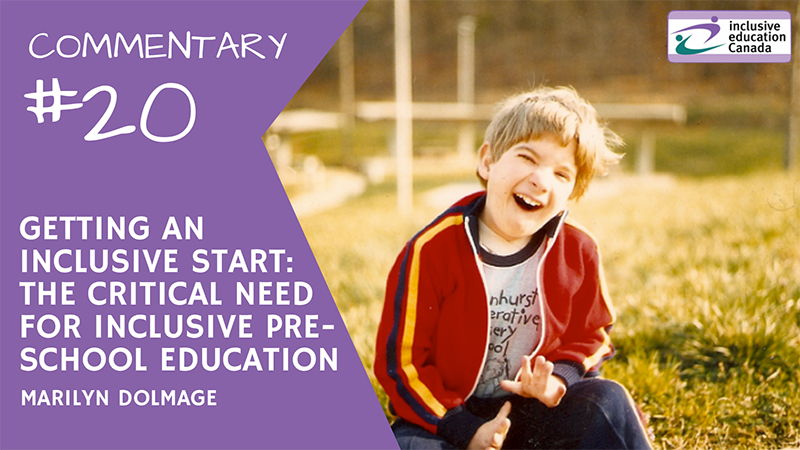 National Inclusive Education Month Commentary #20
National Inclusive Education Month Commentary #20
By Marilyn Dolmage, Parent, Consultant and Advocate
As I consult across Ontario, I always ask what is happening for pre-school children in each community. If their early childhood experiences are inclusive, families are more likely to want inclusion to continue in their neighbourhood schools.
40 years ago, people from Ontario’s children’s services ministry came to the co-operative nursery school, in my small town of Gravenhurst. They promoted inclusion – offering additional support so children of all abilities could play and learn together. That meant our son Matthew left segregated pre-school, and life improved for all three of our children, the whole family.
Living in Toronto now, I’m appalled that children with intellectual and other disabilities – still – start out in segregated pre-schools here, and then remain segregated throughout their lives. Students are not welcomed and not accommodated to learn as members of regular classrooms in their own neighbourhood schools. Toronto school boards try to justify their resistance to change by saying families “choose” segregated classes. Families feel there is no choice; they may not even know what inclusion is.
We must reduce the pressures families feel to segregate little children, as we inspire effective advocacy for inclusion.
It starts with the search for diagnosis; families learn to focus on problems. I had become so accustomed to describing Matthew to anesthetists the night before surgeries, I made the mistake of introducing him to a school principal by listing his health problems. Labels – especially autism, nowadays – disguise individual differences, and reinforce stereotypical prejudgments – parents’ and others’. Parents must re-learn – to focus on strengths, introducing students to their teachers as individuals. How I wish someone had coached me to talk about Matthew’s musical ability, sense of humour, courage in new situations, love of learning.
Society teaches us life is unbearable for those who cannot walk, talk and conform. No wonder parents hope therapy will eradicate or lessen disability. Therapists may judge some children as too disabled to leave segregated settings. Educators must tell parents children need no pre-requisite skills to start neighbourhood kindergarten, and continue in regular class. Matthew resisted therapy in segregated settings. He gained most skills – joyfully – by playing alongside other children. Parents need to be reminded that’s what’s so great about inclusion.
Where children with disabilities are grouped, parents see they need more staff support. But inclusion doesn’t mean one-to-one staff. It’s teachers who must commit to their students’ success and design all classroom learning. EAs should promote, not hinder, connections and learning among classmates. When Matthew was little, I knew he’d had too much adult attention, whenever he came home frustrated and smelling of perfume! Although Matt was judged to have significant physical, communication and educational challenges, in high school he had an Education Assistant for just one-quarter of the day… and that was sometimes too much.
When children are sent away from the mainstream, parents enter that alternate universe too. At first, it’s shocking to see so many children with problems in one place. Parent networks often keep us focused on problems. Stressed-out parents grow very attached to staff who nurture them while working with their children. I was encouraged when segregated pre-school staff celebrated Matthew’s accomplishments. But that increased our isolation from the rest of our community. I needed my friends to stop mourning Matt’s delays and really get to know him. If children are to participate in and contribute to their larger communities, we must help parents be connected too. It was wonderful when parents of Matthew’s Boy Scout friends advocated for his inclusion in high school. Community allies help the whole family.
Some families receive a hostile or begrudging reception when they approach their neighbourhood school. Unlike racial discrimination, most parents of disabled children have never experienced the negative attitudes and obstacles their children meet. If we don’t understand ableism, we might perpetuate it ourselves! Parents need to know the facts: segregation puts disabled students at risk, away from their neighbourhoods and people they know and love, among other vulnerable people. Disabled adults – who have experienced segregation – can tell us why it is wrong. They inspire parents to aim higher: stop seeking “respite” from the “burden” of “caregiving”, and advocate for future “citizenship” – education, careers, real homes, friendship and love.
Every year – at the time of kindergarten registration – trustee, teacher and support staff groups lobby for increased provincial grants. The media reports that special education funding is cut (even when it isn’t). No wonder families worry their child will not receive support in regular class. No one tells them research shows segregation costs more. We must communicate that inclusion is both effective and cost-effective – not just educationally, but for a better future – and it’s a human right.
No one can predict the future: so why do professionals tell parents their children “will never learn”, or “won’t get anything out of academic instruction”? Parents who aim high are criticized as “unrealistic”. Looking back, I resent those who dismissed Matthew’s emerging literacy, and then misunderstood the frustration he felt about that. Professionals should inspire parents, by setting the highest possible individualized academic and social goals. Let’s call this child a “learner” from the get-go, and provide all the amazing technology that comes along.
Most parents haven’t been inside a school since they were kids. Throughout their disabled child’s early years, parents probably learned a lot about therapy, but nothing about universal design for learning. They’ll be reassured to know the flexible instruction their child requires is not a burden. We need to share our excitement that it’s actually an advantage, better for all students!
Life is short and precious. I’m glad we resisted therapists’ pressures over Matthew’s communication, behaviour and mobility. That allowed us more time with each of our other children, and together as a family. How might allies pitch in to help families have more fun?
As advocates for inclusion, let’s do whatever it takes to remove incentives for segregation, share our successes and celebrate families – joyfully, lovingly, and optimistically.
 Marilyn Dolmage, BA, BSW, MSW, assists schools and families to work together to improve education for students of all abilities and create new support relationships. She and her husband Jim led the class action and settlement, concerning abuses at Huronia Regional Centre, an Ontario government institution. The insights of Marilyn’s three children have given her hope for the future. Her family struggled to ensure they attended school together, and to assist her older son to have the education, medical treatment, employment and community life he wanted. Matthew’s sudden death – at the age of 29 – has heightened her resolve to improve policy and strengthen families, schools and communities.
Marilyn Dolmage, BA, BSW, MSW, assists schools and families to work together to improve education for students of all abilities and create new support relationships. She and her husband Jim led the class action and settlement, concerning abuses at Huronia Regional Centre, an Ontario government institution. The insights of Marilyn’s three children have given her hope for the future. Her family struggled to ensure they attended school together, and to assist her older son to have the education, medical treatment, employment and community life he wanted. Matthew’s sudden death – at the age of 29 – has heightened her resolve to improve policy and strengthen families, schools and communities.
